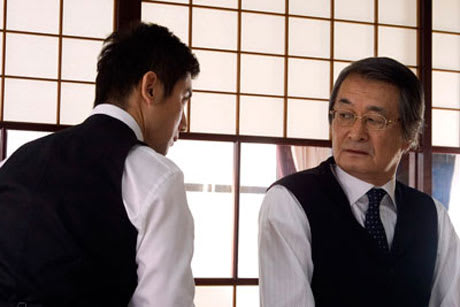The Academy tends to choose soft, sentimental dramas, but this year's Oscar-winner for best foreign film stands a cut above the rest.
Departures centres upon Daigo (Japanese star Masahiro Motoki), a Tokyo cellist who returns to his hometown after his orchestra folds. A typo in a job ad leads him to a funeral parlour instead of a travel agency ("departures" should read "the departed") and an apprenticeship as an undertaker. That's a taboo profession in superstitious Japan, a gig that Daigo hides from his wife, Mika (Ryoko Hirosue).
However, Daigo's stoic boss Ikuei (best known as the hero in 1985's Tampopo) patiently shows him the ropes in how to clean and dress a corpse. Meanwhile, Daigo reconnects with his past, encountering childhood friends that dredge up memories of an abandoned youth and broken dreams of playing the cello.
Departures is a touching drama about transitions, whether it's moving into the afterlife or adapting to a new career or home — leave the past and accept the future.
Daigo holds our sympathy as the hero of this story, though Motoki overplays the comedic moments with silliness, which is typical amongst Japanese actors. However, Yamazaki nearly steals the show with his grizzled, cynical presence. The screen loves his face and he communicates so much emotion without uttering a word.
Director Takita too often relies on strings swelling on the soundtrack and melodramatic close-ups of Daigo to make his point but his handling of the funeral preparation scenes carries the ring of authenticity. These moments where a family watches Daigo prepare their loved one for cremation are powerful and emotional, and anchor this film in reality.
Departures was a hit in its native Japan and will likely find an appreciative audience across the ocean.
(Kinosmith/Regent)Departures centres upon Daigo (Japanese star Masahiro Motoki), a Tokyo cellist who returns to his hometown after his orchestra folds. A typo in a job ad leads him to a funeral parlour instead of a travel agency ("departures" should read "the departed") and an apprenticeship as an undertaker. That's a taboo profession in superstitious Japan, a gig that Daigo hides from his wife, Mika (Ryoko Hirosue).
However, Daigo's stoic boss Ikuei (best known as the hero in 1985's Tampopo) patiently shows him the ropes in how to clean and dress a corpse. Meanwhile, Daigo reconnects with his past, encountering childhood friends that dredge up memories of an abandoned youth and broken dreams of playing the cello.
Departures is a touching drama about transitions, whether it's moving into the afterlife or adapting to a new career or home — leave the past and accept the future.
Daigo holds our sympathy as the hero of this story, though Motoki overplays the comedic moments with silliness, which is typical amongst Japanese actors. However, Yamazaki nearly steals the show with his grizzled, cynical presence. The screen loves his face and he communicates so much emotion without uttering a word.
Director Takita too often relies on strings swelling on the soundtrack and melodramatic close-ups of Daigo to make his point but his handling of the funeral preparation scenes carries the ring of authenticity. These moments where a family watches Daigo prepare their loved one for cremation are powerful and emotional, and anchor this film in reality.
Departures was a hit in its native Japan and will likely find an appreciative audience across the ocean.
